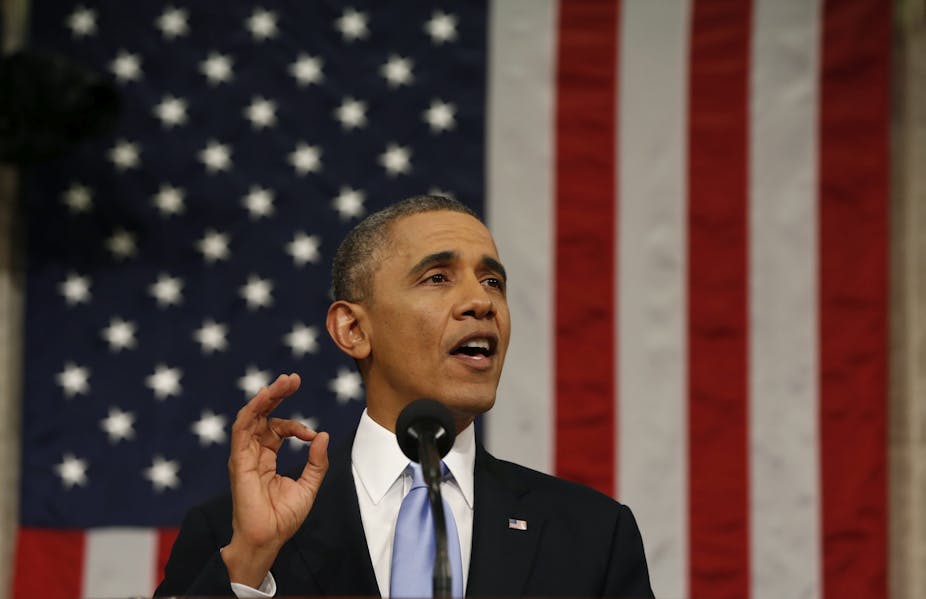Just over half a century ago, after his presidency began with the Bay of Pigs fiasco in Cuba, John F. Kennedy sought out advice from his recently defeated rival, Richard Nixon. The two men had a special affinity for international affairs and tended to regard domestic politics as something of a chore.
As the two men conferred about the botched uprising against Fidel Castro, the young US president reflected on the importance of global politics and the dreariness of issues closer to home. Who gives a damn about the minimum wage, a sardonic Kennedy asked. Only he didn’t say “damn”.
In his State of the Union address this year, US president Barack Obama answered Kennedy’s rhetorical question. He cares about the minimum wage – and he is hoping that millions of other Americans care, too.
Obama tightens his focus
At first glance, and by Kennedy’s standard of importance, Obama’s annual message was small and narrowly focused. He offered no big proposals, no sweeping promises of change. There was a nod to Michelle Obama’s campaign against childhood obesity, a pledge to retrain military veterans and spouses, a pat on the back for his healthcare reforms and a political evergreen, a vow to simply the nation’s tax code.
Oh yes, he announced that he would issue an executive order to raise the minimum wage from its current, scandalously low rate of US$7.25 an hour to $10.10 an hour. A big deal? Not exactly. The move is limited to employees of future federal contractors.
So it would be easy to dismiss Obama’s fifth State of the Union address as inconsequential, just-another-laundry-list speech to be forgotten by tomorrow, as most of these annual messages are.
Such an analysis would fit all too neatly into the conventional narrative of the Obama presidency: the energy and hope of his election are long gone. Yes, he got health care passed (no small achievement), but after that? It has all been incrementalism, hardly the stuff of transformative presidencies.
Why the speech matters
But here’s why Obama’s speech was important, even if it was not particularly memorable. His invocation of income inequality, implicit in his argument for a minimum wage increase, is a milestone in contemporary American politics. In recent years, those who talked about the growing gap between the super-rich and the rest of the nation were condemned as socialists (in America, this is considered the ultimate put-down).
Equally noteworthy is the method Obama has chosen to achieve his goal. He is not going to go to Congress to ask for its approval. Such a move, he knows, would lead only to further dysfunction. Instead, he said he will order the increase on his own.
That’s the sort of move one might expect from a president with high approval ratings, a president who could challenge Congress knowing that he had the people on his side.
But Obama simply doesn’t have the public on his side. His approval ratings have dipped below 50%, just a year after the start of his second term. History suggests that those numbers are destined to dip even lower as he becomes irrelevant in 12 months or so, as attention turns in earnest to the 2016 presidential election.
In that sense, Obama’s decision to go it alone on what could become the signature issue of his second term - the minimum wage and, implictly, income inequality - is a bold move veiled in bland, bureaucratic language.
America’s change of attitude
Hours before the president began his speech, the well-respected Pew Research Centre released a poll showing that only 44% of Americans consider themselves to be middle class. That’s astonishing. It indicates that Americans are beginning to understand the consequences of years of tax policies favouring the super-wealthy, and of trade policies favouring the removal of middle-class jobs to Third World nations.
Obama is not ahead of the income inequality issue. Activists, labour unions and politicians such as Senator Tom Harkin (and even the great folksinger Pete Seeger, who died on Monday in New York) have been warning about the consequences of the nation’s growing income disparities.
But Obama’s embrace of minimum-wage politics is an indication that he is willing to risk his shrinking political capital on an issue that until recently was regarded as the province of far-out lefties: income inequality.
So perhaps this speech will reignite the Obama presidency. It won’t be because of the speech’s rhetoric, which was pretty ordinary. It will be because, for the first time in several years, Obama has seized on the right issue at the right time.

